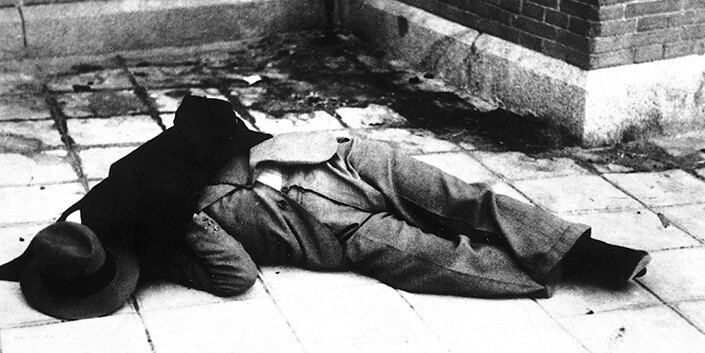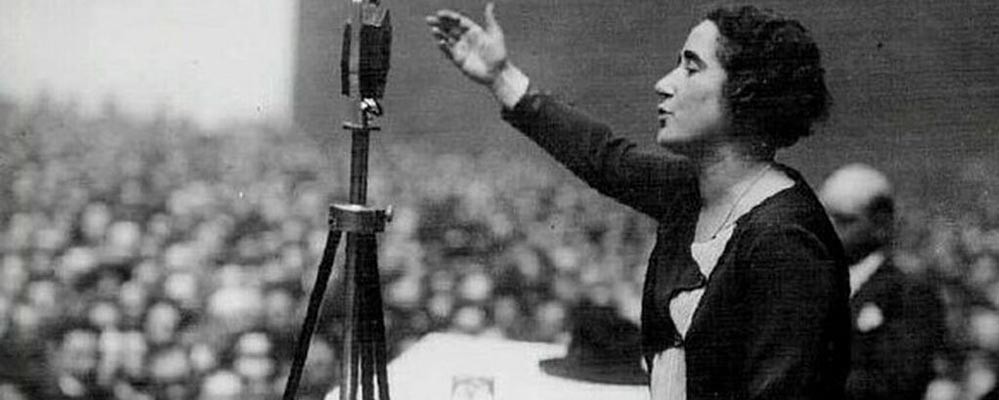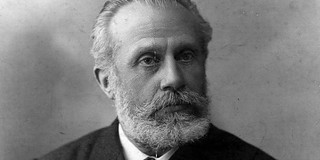The leftist terror that caused the flight of the liberal feminist who won the female vote in Spain
Without a doubt, the achievement of the right to vote for women in Spain has its own name: that of Clara Campoamor, feminist and liberal deputy.
The role of Clara Campoamor in the conquest of the female vote
It was Clara Campoamor's interventions that were decisive in achieving the approval of the female vote in the parliamentary sessions of September 30 and October 1, 1931 in the constituent Cortes. To do this she had to reply to the socialist Victoria Kent, who opposed the right to vote for women. A few months before the leader of the PSOE Margarita Nelken published an allegation against the female vote, under the argument that this would imply "realizing one of the greatest desires of the reactionary element."
The left tries to appropriate her figure
Although Clara Campoamor was a classic liberal and showed a clear rejection of socialism and communism, the left has tried to appropriate her figure. This is what the Socialist Party (PSOE) has done. In September of last year, the minister spokesperson for the Government, the socialist María Jesús Montero, referred to Clara Campoamor saying who "fled Spain after the 1936 Coup."
Chronologically it is a correct statement, but to tell the truth the feminist deputy fled from the left for fear of being murdered by socialists or communists. After her departure to Switzerland, she published a book in French titled "La révolution espagnole vue par une républicaine" (The Spanish Revolution as seen by a Republican). In it she recounted the terrible experience lived after the victory of the Popular Front and the leftist terror of the Republican side.

Clara Campoamor's story about the violence and illegalities of the Popular Front
In this work, Campoamor denounced the violation of legality by the leftist Government of the Popular Front that emerged from the elections of February 1936:
"The republican parties that came to power after the electoral victory, although they were in a minority in the left-wing coalition, exhausted their strength and their moral credit in two thankless tasks: one consisted of making concessions to the extremists who, since February 16, They celebrated their victory with fires, strikes and illegal acts as if they had to fight against an enemy government. The other objective of the victors was to reach the highest positions in the State as soon as possible, bypassing of all the established rules and, throwing away, without the slightest concern for political honesty, the principles of continuity that a regime that is born must preserve, if it aspires to last.

“Churches were burned, priests, women and even candy sellers were killed in the streets”
Campoamor commented that "the Republican Constitution was violated and in a session, fleeting as a lightning bolt, the parliamentary majority made the last traces of respect and consideration that public opinion had kept disappear. for the laws and republican institutions." Later, she explained how the situation deteriorated after the leftist victory in the February 1936 elections:
"The government was increasingly incapable of maintaining public order, not to mention the serious situation created in Madrid by the strikes we have talked about. In the countryside, the attacks of the revolutionary elements against the right, the members of the Agrarian Party and the radicals, and in general against all the bosses, multiplied. They appropriated the lands, they beat up their enemies, they attacked all their adversaries, treating them as "fascists". They burned churches and public buildings, on the southern roads they stopped cars, exactly as in the times of banditry, demanding from the occupants a contribution in favor of the International Red Relief.
Massacres were organized against right-wing people under childish pretexts. This is how on May 5th the news spread that Catholic ladies and priests were killing children by distributing poisoned candies to them. An attack of collective madness took over the popular neighborhoods, where churches were burned, priests, women and even candy sellers were killed in the streets. In the Cuatro Caminos neighborhood, a woman was cruelly murdered. young French school teacher."

Campoamor called the murder of Calvo Sotelo a “state crime”
After reporting the murder of the right-wing deputy José Calvo Sotelo on July 13, 1936 in Madrid, which Campoamor called a "state crime", the feminist pointed out that "the government remained indecisive and inactive", and added: "They were scandalized in Madrid when they saw that Moreno, the lieutenant of the Assault Guard who led those who killed Calvo Sotelo, as well as Condé, walked freely through the streets. Some of the assault officers had informed the Minister of the Interior and President of the Council, Casares Quiroga, that this body would not allow punishment to be applied to the perpetrators. of the murder."
“Socialists and communists were owners of veritable arsenals of weapons and ammunition”
Clara Campoamor lived through the beginning of the Civil War in Madrid, a city under Republican control. In chapter V she pointed out to what extent the left had prepared thoroughly for war: "Socialists and communists were owners of veritable arsenals of weapons and carefully hidden ammunition. Only the unionists and the anarchists had less." In chapter VIII, on the beginning of the war, she noted: "the socialist and communist militias were already organized. They were militarily trained, for time and secretly from the commanders, by officers, among others by a lieutenant of the engineering corps."
Campoamor added: "These Marxist militias, organized with a view to the revolution of October 1934, had continued to develop, and the triumph of the Popular Front only made their existence public. Armed and in close ranks they had paraded in Madrid on May 1, on the occasion of the labor holiday, causing scuffles with the fascists."

“Since the first days of the struggle, a bitter terror has reigned in Madrid”
Regarding the situation in the Republican rearguard, Campoamor said the following: "Since the first days of the struggle, a bitter terror has reigned in Madrid. At first glance, public opinion has succumbed to the temptation to attribute to the anarchists the violence committed in the cities, especially in Madrid. History will one day tell if they alone have been charged with these acts in a fair manner. In any case, it is up to the governments, without distinction, assume responsibility."
Campoamor wrote that in Madrid"the anarcho-syndicalists have been concerned with supplying themselves with weapons and ammunition for the "final fight" and with "cleaning" the capital of the Republic of the fascists, more or less authentic in the first place. place, followed by the republicans, and even the Marxists". After describing some more of the nonsense that the population had to suffer because of the unionists, the feminist added: " The icing on the cake of that charming chaos was five or six dynamite bombs that the strikers placed in buildings under construction every day to make them explode into the air!"

Campoamor recounted how leftist terror spread to more and more victims
It was logical that Campoamor was afraid for her safety. She had been a deputy of the Radical Republican Party, against which the PSOE had organized the coup d'état of 1934, when the radical Lerroux decided to integrate into his government some members of the right-wing coalition that had won. the general elections of November 1933. In her book, Campoamor explained how political persecution spread in the republican zone:
"At first fascist elements were persecuted. Then the distinction became blurred. People belonging to the right were arrested and shot, then their sympathizers, later members of Mr. Lerroux's Radical Party, and then - tragic error or class revenge - people from the republican left were included."

Campoamor knew that she was in danger, and that is why she fled to Switzerland at the beginning of September 1936. In the book's appendix she explains her decision like this:
"I left Madrid at the beginning of September. The anarchy that reigned in the capital in the face of the impotence of the government, and the absolute lack of personal security, even for liberal people - especially, perhaps, for them - They imposed this measure of prudence on me... If the great sympathy that is always felt for the situation of those who defend themselves can go so far as to explain popular errors, this same sympathy refuses to go as far as the dark and useless sacrifice of one's own It is also known that the authors of excesses, or those who have allowed them to be committed, always find a way to apologize, even if only by pretending that revolutions must be judged as a whole and not in their individual parts. details, however eloquent they may be. And I did not want to be one of those details sacrificed uselessly! I did not want to leave without taking with me my eighty-year-old elderly mother and my little niece, the only people who "They were in my charge."
Although Campoamor requested it on several occasions, the Franco regime did not allow her return to Spain. She died in Lausanne, Switzerland, on April 30, 1972, without having been able to return to her homeland.
|
Don't miss the news and content that interest you. Receive the free daily newsletter in your email: Click here to subscribe |
- Most read
- The ten oldest national flags in the world that are still in use today
- The Pegasus case and how it could end with Pedro Sánchez due to a decision by France
- A large collection of Volkswagen cars hidden in an abandoned mine in Switzerland
- Eurofighter vs F-35: the opinions of professional pilots on these advanced fighters
- Sánchez vindicates the founder of the PSOE, who encouraged a coup and supported a dictatorship
- The firearms used by the Pontifical Swiss Guard, the smallest army in the world
- The icy deployment of the Spanish EF-18 and A400M planes under the snow in Lithuania

 ES
ES





Opina sobre esta entrada: